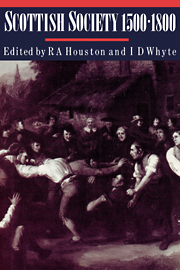Book contents
- Frontmatter
- Contents
- List of tables
- Notes on contributors
- List of abbreviations
- Introduction: Scottish society in perspective
- 1 Population mobility in early modern Scotland
- 2 Scottish food and Scottish history, 1500–1800
- 3 Continuity and change in urban society, 1500–1700
- 4 Women in the economy and society of Scotland, 1500–1800
- 5 Social responses to agrarian ‘improvement’: the Highland and Lowland clearances in Scotland
- 6 ‘Pretense of blude’ and ‘place of thair dwelling’: the nature of highland clans, 1500–1745
- 7 North and south: the development of the gulf in Poor Law practice
- 8 Scotland and Ireland, 1600–1800: their role in the evolution of British society
- 9 Kindred adjoining kingdoms: an English perspective on the social and economic history of early modern Scotland
- Bibliography of printed sources and secondary works
- Index
9 - Kindred adjoining kingdoms: an English perspective on the social and economic history of early modern Scotland
Published online by Cambridge University Press: 08 March 2010
- Frontmatter
- Contents
- List of tables
- Notes on contributors
- List of abbreviations
- Introduction: Scottish society in perspective
- 1 Population mobility in early modern Scotland
- 2 Scottish food and Scottish history, 1500–1800
- 3 Continuity and change in urban society, 1500–1700
- 4 Women in the economy and society of Scotland, 1500–1800
- 5 Social responses to agrarian ‘improvement’: the Highland and Lowland clearances in Scotland
- 6 ‘Pretense of blude’ and ‘place of thair dwelling’: the nature of highland clans, 1500–1745
- 7 North and south: the development of the gulf in Poor Law practice
- 8 Scotland and Ireland, 1600–1800: their role in the evolution of British society
- 9 Kindred adjoining kingdoms: an English perspective on the social and economic history of early modern Scotland
- Bibliography of printed sources and secondary works
- Index
Summary
If comparisons are odious, it is largely so becauseof the perennial difficulty of separating the recognition of difference from the ascription of worth. If, among comparisons, international comparisons are commonly more odious than others, this is principally a result of the fact that both the detection of differences and the accompanying evaluation are so frequently coloured by national sentiment. Nowhere is this more apparent than in the historiographies of England and Scotland. If these ‘kindred adjoining kingdoms’ have experienced a complex social, political and cultural interrelationship throughout most of their recorded histories – an involvement which became closer in the course of the early modern period – it is one which has attracted surprisingly little disciplined historical analysis outside the political and diplomatic spheres. Historians of early modern England, for the most part, have shown a marked tendency to ignore the Scottish dimension of British history. Scottish historians have been far less indifferent to the existence of their closest neighbour. Yet they have demonstrated a certain ambivalence in their attitudes towards the interrelationship of the two nations; on the one hand insisting upon aspects of Scottish uniqueness and autonomy, while on the other hand hitching Scotland's wagon to processes of historical development which the English persist in regarding as essentially their own. Both the insularity (and on occasion blinkered anglocentricity) of the English, and the Scottish oscillation between a truculent exceptionalism and an insistence upon inclusion have many causes. The most immediately obvious of these are the conventional structures of academic curricula and the imperfect overlap between the areas of specialisation which they encourage.
- Type
- Chapter
- Information
- Scottish Society, 1500–1800 , pp. 245 - 260Publisher: Cambridge University PressPrint publication year: 1989
- 5
- Cited by



